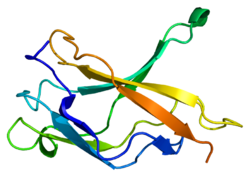NFKB1
Protein-coding gene in the species Homo sapiens From Wikipedia, the free encyclopedia
Nuclear factor NF-kappa-B p105 subunit is a protein that in humans is encoded by the NFKB1 gene.[5]
This gene encodes a 105 kD protein which can undergo cotranslational processing by the 26S proteasome to produce a 50 kD protein. The 105 kD protein is a Rel protein-specific transcription inhibitor and the 50 kD protein is a DNA binding subunit of the NF-kappaB (NF-κB) protein complex. NF-κB is a transcription factor that is activated by various intra- and extra-cellular stimuli such as cytokines, oxidant-free radicals, ultraviolet irradiation, and bacterial or viral products. Activated NF-κB translocates into the nucleus and stimulates the expression of genes involved in a wide variety of biological functions; over 200 known genes are targets of NF-κB in various cell types, under specific conditions. Inappropriate activation of NF-κB has been associated with a number of inflammatory diseases while persistent inhibition of NF-κB leads to inappropriate immune cell development or delayed cell growth.[6]
Interactions
NFKB1 has been shown to interact with:
References
Further reading
External links
Wikiwand - on
Seamless Wikipedia browsing. On steroids.






